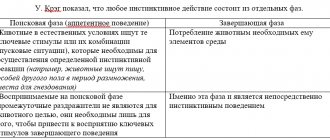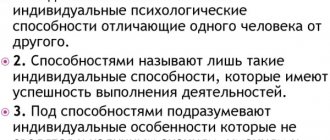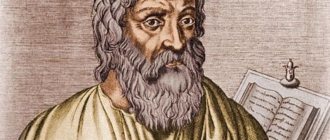Definition
Instinct is a genetically determined pattern of behavior of living beings. It is based on the desire of the individual and the entire species to survive. Each option is designed to protect the animal or person from threats.
Most animals have:
- The instinct of self-preservation . This is an innate reaction of individuals to danger and the desire to protect themselves.
- Instinct for procreation . Animals and people have an innate attraction to the opposite sex, aimed at procreation.
Animal instincts in humans are not only behavioral options of a biological nature, that is, to satisfy the needs necessary for survival, but also to embody personal needs for power, dominance, and communication.
Animal instinct is an unconditioned reflex that forms the basis of animal behavior. For higher animals, in the process of individual development, basic instincts are modified, which makes it possible to achieve more complex behaviors.
How is instinct different from reflex?
There is a misconception that instinct is a reflex. But these are different concepts.
Instinct is a set of behavioral reactions, and reflex is a single, simpler action.
Instinct
Classification of reflexes
I.P. Pavlov divided all reflexes into unconditioned and conditioned, regardless of their origin, mechanism of action on the central nervous system and biological significance.
However, you can approach this issue in more detail and make a grouping according to a number of individual characteristics. For example, based on the type of receptors, reflexes are :
- exteroceptive (tactile, olfactory, visual, auditory);
- interoceptive (receptors of internal organs);
- proprioceptive (muscular, joint).
By effector type:
- motor (somatic);
- vegetative (digestive, cardiovascular, sweating).
According to biological characteristics:
- protective;
- digestive;
- sexual
According to the passage of a nerve impulse (according to the location of reflex arcs):
- spinal cord reflexes (spinal);
- brain reflexes.
Let’s leave a detailed breakdown for particularly inquisitive readers, and we ourselves will consider the two enlarged categories of reflexes that Pavlov identified.
Types of instincts
Instinct is behavior determined genetically. There are several options, divided into groups.
They are:
- Vital - this concerns food and drink instincts, self-preservation;
- Role-playing - erogenous and sexual instinct;
- Self-development - instincts of play, exploration and others. There are several main types.
Self-preservation and survival
Biological instincts are behaviors that ensure survival.
They are manifested by the need:
- satisfy hunger;
- look for a warm place during cold weather;
- treatment in the presence of a disease;
- the need to hide from the sun in the heat.
These are natural instincts, but people know how to control them.
The instinct of self-preservation arises especially clearly in extreme situations. It is believed that the main instinct is self-preservation, since it does not allow one to behave destructively or take risks. It goes hand in hand with fear. Fear is an instinct that manifests itself even in infants when they worry about losing contact with their mother.
Reproduction, parent
Sexual instinct is one of the strongest, the most basic. Initially, it is perceived as a way to satisfy physiological needs. But at a higher level, it manifests itself as a manifestation of strong feelings between representatives of the opposite sex.
Love is an instinct that is aimed at subsequent procreation. But not all modern people strive for procreation, but this does not apply to intuitive behavior.
Important! It is the instinct to reproduce that allows people and animals to maintain populations. If the chain is broken, it leads to the extinction of the species.
Parental instinct is a set of reactions belonging to the same group. In females, it is manifested by caring for the offspring.
Maternal instinct is a controversial phenomenon, since in some women it does not manifest itself. But in some animal species it also spreads to the offspring of other species. For example, there are cases where a duck raised chickens or a cougar fed kittens.
Hunting
This instinct is a form of behavior in men, which was especially pronounced in primitive times, when it was necessary to obtain food.
Now this is manifested by a love of fishing and hunting, but not everyone has it.
Domination and power
This instinct is behavior caused by the need for leadership and power. People with pronounced dominance lead the crowd, organize and manage.
Every group has a leader, even if it is not obvious.
Nothing suppresses the feeling of freedom more than the herd instinct.
MIKHAIL MIKHAILOVICH MAMCHICH
Social
Human social instincts are a series of behavioral reactions that ensure socialization. First of all, people manifest altruism, expressed in caring for others, kindness, and a desire for peace.
Social instinct is a feature that is not expressed in everyone.
Freedom and independence
This instinct leads to independence. It occurs in infants who do not allow themselves to be fed or swaddled.
With age, a person learns to adapt the desire for freedom to common interests.
Religion
Religious instinct is a person’s desire to believe in a Higher Power. It does not appear in everyone.
Human instincts are a set of feelings and behavioral reactions. People must be able or manage in order to be fully accomplished as individuals.
Sexual instinct or desire?
As we've discovered, instinct is often confused with desires and needs - especially when it comes to sexual desire. It would seem so easy to give in to the call of nature, hiding behind the great goal of reproduction, and leave your genes everywhere. And yet, “basic instinct” is nothing more than a person’s simple desire to receive pleasure (after all, almost every one of us first discovers masturbation, and only then sex with a partner).
If the need for intercourse was truly instinctive, then all people on Earth would do it in exactly the same way and, moreover, there would be a single signal of readiness on both sides (perhaps life would become easier).
Mammals are once again paying the price for big brains - and they even have to learn sex. Animals raised in captivity often do not perceive “signs of attention” from potential partners, and their attempts at physical intimacy are regarded as aggression and violence. Different-sex macaques raised outside the pack will most likely begin to groom each other (the classic program is mutual grooming and cuddling), but are unlikely to understand how and why to have sex. And if they do understand, then the female will face the next test - the birth of a baby and the high probability of its early death, because mammals have no instincts.
Examples
In modern people, like thousands of years ago, the instinct of life is reactions that have a behavioral form of expression. They become more pronounced in situations that pose a danger to health and life.
Scientists believe that consciousness is an instinct, therefore, when danger is perceived, mechanisms assigned to self-preservation begin to operate.
If a person understands that he may be in danger, ready-made stimuli act in the subconscious. In people, this manifests itself as a fear of spiders, the dark, and heights.
Instinct is an innate feeling, like self-preservation, that begins to act when life is threatened. Then the person tries to escape at any cost
Such reactions manifest themselves as follows:
- when burned, a person withdraws his hand;
- dresses in the cold;
- if there is not enough air, it goes out into the air;
- If he doesn't know how to swim, he doesn't go into the water.
The need to procreate causes the desire to give birth to a child and raise him.
In people, instinct is a reaction that they can control, but in some it can take on inappropriate forms. For example, maternal instinct turns into overprotection or, conversely, into a careless and irresponsible attitude towards one’s own children.
The first instinct is self-preservation, but the others are no less important for life. Maternal innate instincts manifest themselves in girls in the desire to play with dolls. They are more clearly visible in women expecting a child, when the expectant mother begins to arrange housing.
Instinct is nature, which explains some of the behavioral features of men, which are determined by the fact that the male wants to get a female for procreation, but if the conquest is too easy, the prey quickly becomes boring. Such men become avid bachelors with increased libido.
Positive instincts are social, for example, if a person has expressed altruism, he strives to help others, he can become a doctor, psychologist, or volunteer.
People who actively defend their personal freedom express protests from early childhood and have a pronounced instinct for freedom. They turn into politicians, journalists, public figures.
Natural instinct is the most complex act of innate behavior. It has two main features:
- independent of the internal state of the body;
- the stimulus acts only as a trigger for instinctive behavior and does not oblige the entire act to be carried out.
Attention! Darwin believed that instinct is the unconscious, that this type of behavior is characteristic of a particular species and is fixed hereditarily.
What is the role of unconditioned reflexes in human life?
Human evolution over the centuries has been accompanied by changes in the genetic apparatus, the selection of traits that are necessary for survival in the surrounding nature. The nervous system became a highly organized matter. What is the significance of unconditioned reflexes - answers can be found in the works of physiologists Sechenov, I.P. Pavlova, P.V. Simonova. Scientists have identified several important functions:
- maintaining homeostasis (self-regulation of the internal environment) in optimal balance;
- adaptation and adaptation of the body (mechanisms of thermoregulation, respiration, digestion);
- preservation of species characteristics;
- reproduction.
Acquired Instincts
Acquired instinct is the habits that each person develops in accordance with his innate inclinations. These are not hereditary traits. Such an instinct is an unconditioned reflex that is activated when a person needs to perform a certain action.
Unconditioned instinct is a reaction aimed at increasing safety and survival in extreme conditions. They can be not only positive, but also negative.
Positive is a mixture of good instincts to increase the survival rate and safety of society. These include decency, friendliness, and conscientiousness.
Negative instinct is in psychology acquired qualities, such as meanness, cynicism, deception. They are formed in groups of people with an increased level of the leading component.
Reflex is...
A reflex manifests itself in the response of a living organism to external or internal stimuli. This response occurs due to the presence of special sensitive formations (receptors) and is controlled by the nervous system.
A more or less clear concept of reflexes was put forward by the French philosopher, mathematician, physicist and physiologist René Descartes in the 17th century. He is rightfully considered the father of reflexology - a scientific direction in psychology, where mental activity is considered as a set of reflexes caused by the influence of the environment on the nervous system of a living being.
Descartes' teaching is based on an understanding of the mechanism of involuntary movements that occur as a result of the influence of external stimuli on receptors, from which the signal travels through peripheral nerves to the brain and then to the muscles.
In the 18th century, Descartes' theoretical legacy was expanded and supplemented by the research of a number of scientists in the field of physiology and anatomy. In particular, special reflexes characteristic of the internal organs of mammals were identified, and the concept of a reflex (nervous) arc was introduced.
In 1863, the work of the outstanding Russian physiologist and naturalist I.M. Sechenov “Reflexes of the Brain” was published, in which the statement was put forward that “all acts of conscious and unconscious life, according to the method of origin, are reflexes.”
Sechenov's conclusions about the reflex principle of brain activity (brain and spinal cord), as well as about central inhibition, served as the basis for the discovery of conditioned reflexes by I.P. Pavlov .
Comparison table between conditioned and unconditioned reflexes
| Comparison of the characteristics of conditioned (acquired) and unconditioned (innate) reflexes | |
| Unconditional | Conditional |
| Congenital | Acquired during life |
| Present in all representatives of the species | Individual for each organism |
| Relatively constant | Appear and disappear with changes in the external environment |
| Formed at the level of the spinal cord and medulla oblongata | Carried out through the work of the brain |
| Laid in utero | Developed against the background of innate reflexes |
| Occurs when a stimulus acts on certain receptor areas | Manifest under the influence of any stimulus that is perceived by the individual |
Higher nervous activity operates in the presence of two interrelated phenomena: excitation and inhibition (congenital or acquired).











